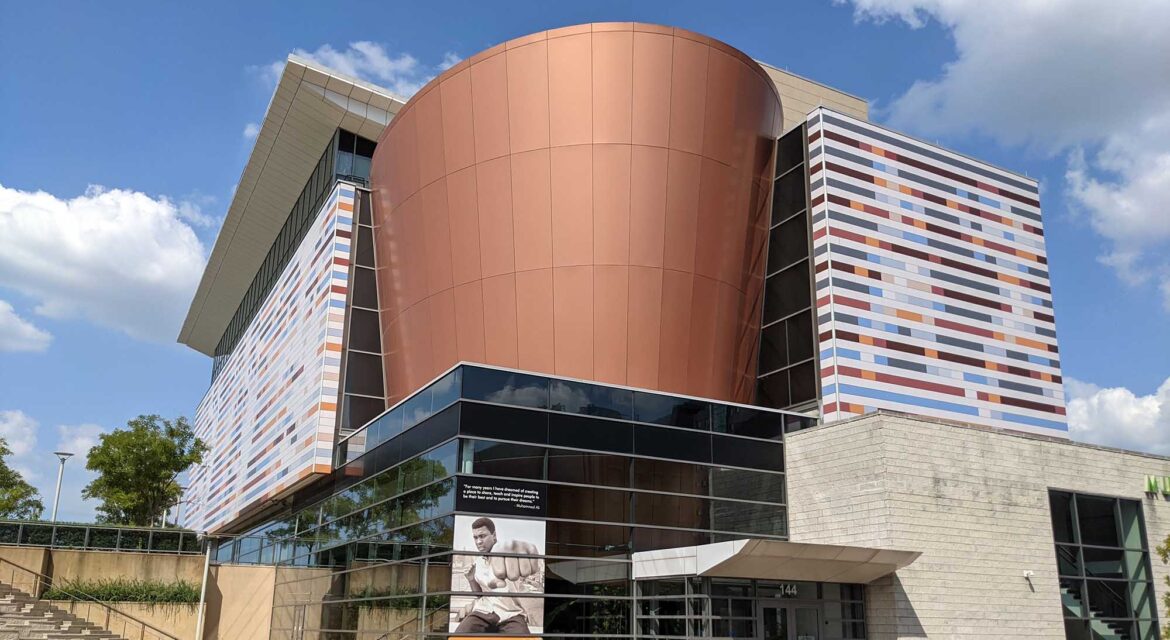 The Muhammad Ali Center is a multicultural center dedicated to the life and legacy of Muhammad Ali. Located in downtown Louisville, Kentucky, the facility is part museum, part community center and part interactive experience but wholly dedicated to inspiring audiences on every level and through all of these elements. In doing so, it highlights what it can look like for an intangible legacy to take physical form in a way that connects audiences, eras and communities.
The Muhammad Ali Center is a multicultural center dedicated to the life and legacy of Muhammad Ali. Located in downtown Louisville, Kentucky, the facility is part museum, part community center and part interactive experience but wholly dedicated to inspiring audiences on every level and through all of these elements. In doing so, it highlights what it can look like for an intangible legacy to take physical form in a way that connects audiences, eras and communities.

A Generational Icon
 Muhammad Ali was an American professional boxer, activist and philanthropist. Frequently ranked as the best heavyweight boxer of all time, he was born and raised in Louisville, where he began training when he was only 12. His objections to serving in the Vietnam War made him a generational icon, but his goals and aspirations were always much bigger than boxing. After his boxing career ended he became totally focused on activism and philanthropy. He remained an active public figure until his death in 2016.
Muhammad Ali was an American professional boxer, activist and philanthropist. Frequently ranked as the best heavyweight boxer of all time, he was born and raised in Louisville, where he began training when he was only 12. His objections to serving in the Vietnam War made him a generational icon, but his goals and aspirations were always much bigger than boxing. After his boxing career ended he became totally focused on activism and philanthropy. He remained an active public figure until his death in 2016.
In 2005, he and his wife founded the Muhammad Ali Center. He wanted to share his inspiration with the world that compelled him to do everything from hand-deliver food and medical supplies to teach children the virtues of tolerance and understanding to raise money for countless American charities. He was honored by Amnesty International with their “Lifetime Achievement Award” and was also awarded the Presidential Medal of Freedom, among many other awards.
The Muhammad Ali Center celebrates his life and accolades across six distinct sections that represent his six core principles, each of which is designed to provide viewers with a different experience that has come to serve and support the wider Louisville community.

Experiencing the Six Core Principles
 The Six Core Principles that fueled Ali’s journey are confidence, conviction, dedication, giving, respect and spirituality. The Muhammad Ali Center features exhibitions that are dedicated to each of these principles while simultaneously being interwoven with pieces of history that defined his life. A two-level pavilion that features Ali’s boxing memorabilia further defines the experiences that audiences can have with these principles and these pieces of history.
The Six Core Principles that fueled Ali’s journey are confidence, conviction, dedication, giving, respect and spirituality. The Muhammad Ali Center features exhibitions that are dedicated to each of these principles while simultaneously being interwoven with pieces of history that defined his life. A two-level pavilion that features Ali’s boxing memorabilia further defines the experiences that audiences can have with these principles and these pieces of history.
Additionally, visitors can directly engage with Ali’s legacy by getting into a recreated boxing ring that is based on his Deer Lake Training Camp. Ali’s greatest fights are also able to be experienced via on video-on-demand terminals. The Ina B. Bond Gallery, the Howard Bingham Gallery and the LeRoy Neiman Gallery are three distinct galleries within the Muhammad Ali Center that offer unique and ever-changing experiences for visitors. Events that take place at the facility on a regular basis bring together the community from all corners of the city and region.
The cost of admission to the Muhammad Ali Center varies depending on age, with additional purchases for special events. As an additional means of direct revenue, the gift shop has a variety of products for purchase. The Muhammad Ali Center also has a variety of options to meet just about any special event need. Wedding ceremonies, receptions, showers, holiday parties and reunions are just a few of the types of events that the facility can host. Donations to the non-profit organization are also readily accepted.
All of these experiences and opportunities highlight the economic and cultural impact that the Muhammad Ali Center has had on the entire Louisville community. That impact isn’t specific to any one individual or any single era for the city, showcasing the multiple benefits that can be enabled when a legacy takes physical form in such a prominent and powerful manner.

Beyond the Life and Legacy of an Individual
 While few people have the fame or notoriety of Muhammad Ali, the legacy that the Muhammad Ali Center celebrates isn’t just about his life, proving that such efforts are about more than any one individual or endeavor. In becoming such an important part of Museum Row in Louisville, the Muhammad Ali Center further highlights how the effort to create and define these sorts of attractions can benefit a community, stakeholders, and an entire city in the present and future.
While few people have the fame or notoriety of Muhammad Ali, the legacy that the Muhammad Ali Center celebrates isn’t just about his life, proving that such efforts are about more than any one individual or endeavor. In becoming such an important part of Museum Row in Louisville, the Muhammad Ali Center further highlights how the effort to create and define these sorts of attractions can benefit a community, stakeholders, and an entire city in the present and future.

